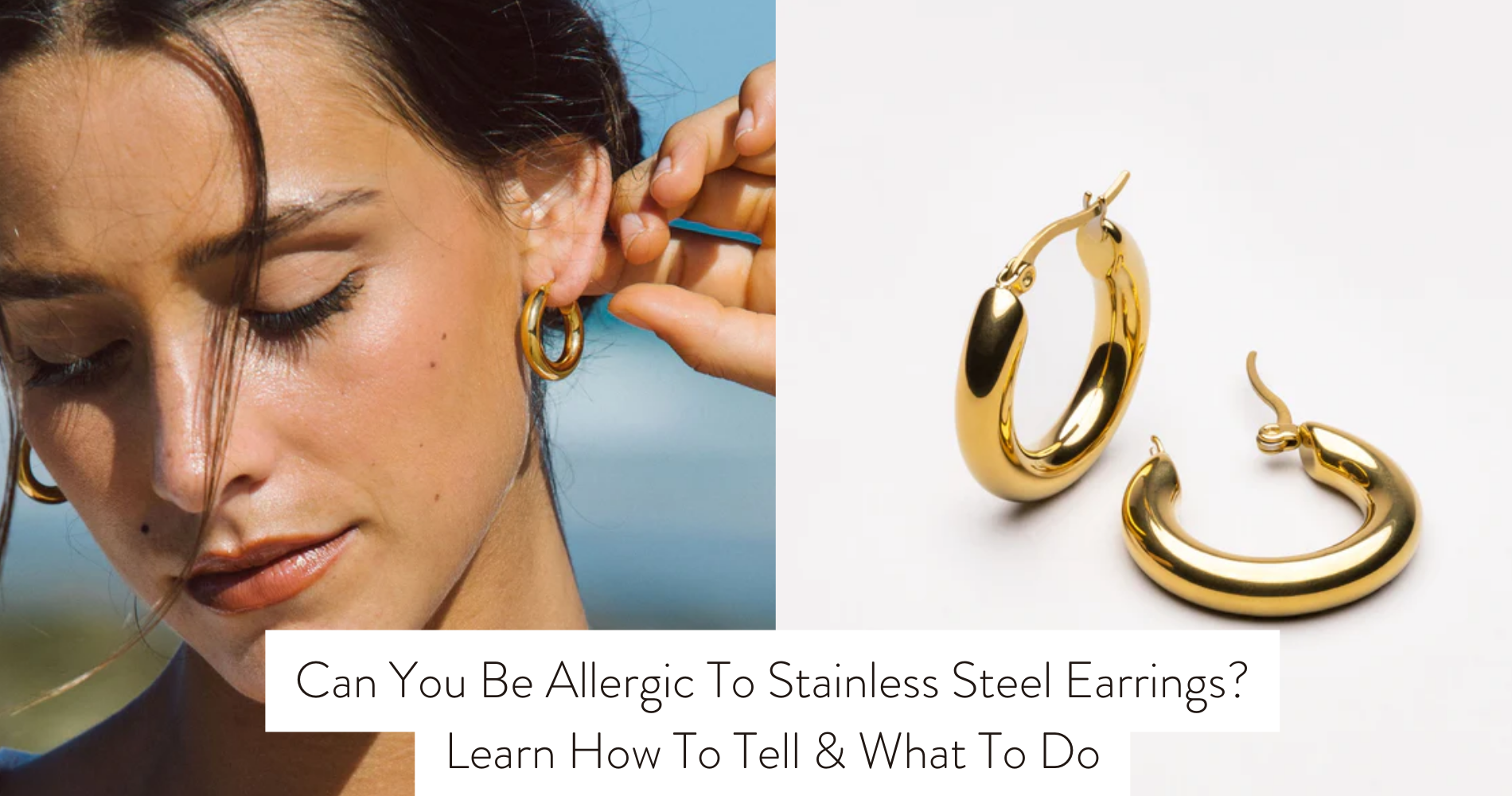
Can You Be Allergic To Stainless Steel Earrings? Learn How To Tell & What To Do
Do you love wearing stainless steel earrings but have been experiencing discomfort lately? Can you be allergic to stainless steel earrings? In this article, you will learn how to tell if you have an allergy to this popular jewelry material and what steps to take to alleviate any discomfort.
By understanding the signs of a stainless steel earring allergy, you can easily identify if you are affected. Don't worry, we've got you covered with tips on how to alleviate the discomfort and prevent future allergic reactions.
Furthermore, we'll delve into alternative earring materials, including waterproof earrings, suitable for individuals with sensitive ears. So, let's delve into the details and ascertain whether stainless steel earrings might be the source of your discomfort!
Signs of a Stainless Steel Earring Allergy
If you're experiencing redness, itching, or swelling around your earlobe after wearing stainless steel earrings, you may be showing signs of a stainless steel earring allergy. It's important to recognize these common symptoms in order to seek appropriate treatment options.
When you wear stainless steel earrings, your body may react to the nickel content in the metal, causing an allergic reaction. This can lead to discomfort and irritation, making it crucial to address the issue promptly.
The most common symptoms of a stainless steel earring allergy include redness, itching, and swelling around the earlobe. You may also experience a rash or skin irritation. These symptoms can vary in severity, with some individuals experiencing mild discomfort while others may have more severe reactions. It's important to pay attention to your body's response to wearing stainless steel earrings and seek medical advice if you notice any of these symptoms.

Treatment options for a stainless steel earring allergy typically involve avoiding contact with nickel-containing metals. This means refraining from wearing stainless steel earrings and opting for hypoallergenic metals such as titanium, niobium, or surgical-grade stainless steel. Additionally, applying a topical corticosteroid cream or using over-the-counter antihistamines can help alleviate the symptoms. It's important to consult with a healthcare professional to determine the best course of treatment for your specific situation.
Identifying if You Have a Stainless Steel Earring Allergy
To determine if you have a stainless steel earring allergy, carefully observe your body's reaction to wearing stainless steel earrings. Pay close attention to any symptoms that occur after wearing the earrings. One of the most common symptoms of a stainless steel earring allergy is itching or redness around the pierced area. You may also experience swelling or a rash, which can be uncomfortable and irritating. If you notice these symptoms consistently after wearing stainless steel earrings, there's a high possibility that you have an allergy to the metal.
It's important to note that stainless steel allergies are relatively rare, as stainless steel is generally considered hypoallergenic. However, some people may still have a reaction to the nickel content in stainless steel. To treat a stainless steel earring allergy, the first step is to remove the earrings and avoid wearing them again. You can also apply a hydrocortisone cream or take an antihistamine to help alleviate the symptoms. If the symptoms persist or worsen, it's advisable to consult a dermatologist or allergist for further evaluation and treatment options.
How to Alleviate Discomfort From a Stainless Steel Earring Allergy
To alleviate discomfort from a stainless steel earring allergy, try using a topical corticosteroid cream. These creams can help reduce inflammation and relieve itching caused by the allergic reaction. Simply apply a small amount of the cream to the affected area, following the instructions on the packaging.
In addition to corticosteroid creams, there are other ways to treat stainless steel earring allergies. One home remedy is to apply a cool compress to the affected area. This can help soothe the skin and reduce redness and swelling. You can make a cool compress by wrapping ice cubes in a clean cloth or using a cold pack.
Another option is to use over-the-counter antihistamine creams or oral medications. These can help alleviate itching and reduce allergic reactions. However, it's important to consult with a healthcare professional before using any medication, especially if you have any pre-existing medical conditions or are taking other medications.
If the symptoms persist or worsen, it's recommended to remove the stainless steel earrings and avoid wearing them in the future. Consider switching to hypoallergenic or nickel-free earrings to prevent future allergic reactions. Remember, everyone's body is different, so finding the right solution may require some trial and error.
Tips for Preventing Allergic Reactions to Stainless Steel Earrings
To prevent allergic reactions to stainless steel earrings, it's important to take certain precautions before wearing them. One of the most effective ways to prevent allergic reactions is to clean your stainless steel earrings regularly. Use a mild soap and warm water to gently clean the earrings, and be sure to dry them thoroughly before wearing them again. This will help remove any dirt, oils, or bacteria that may have accumulated on the earrings, reducing the risk of irritation or an allergic reaction.
Additionally, consider coating the posts or hooks of your stainless steel earrings with a layer of clear nail polish. This can create a barrier between your skin and the earrings, reducing the direct contact and minimizing the risk of an allergic reaction.
Alternative Earring Materials for Sensitive Ears
If you have sensitive ears and experience allergic reactions to stainless steel earrings, there are alternative earring materials that you can consider. Hypoallergenic earring options are available to help prevent allergic reactions and provide relief for those with sensitive ears.

One popular hypoallergenic metal for earrings is titanium. Titanium is known for its biocompatibility, meaning it's less likely to cause irritation or allergic reactions. It's lightweight, durable, and corrosion-resistant, making it a great choice for earrings.
Another hypoallergenic metal option is niobium. Niobium is similar to titanium in terms of its biocompatibility and resistance to corrosion. It's also lightweight and can be an ideal alternative for sensitive ears.
Other hypoallergenic earring materials include surgical stainless steel, which is specifically designed to be safe for those with sensitive skin, and 14k gold or higher, which is less likely to cause allergic reactions compared to lower karat gold.
When looking for alternative earring materials, it's essential to choose hypoallergenic options that are free from nickel, lead, and other common allergens. By selecting the right hypoallergenic metals for earrings, you can enjoy wearing earrings without experiencing any allergic reactions.
Frequently Asked Questions
Can Stainless Steel Earrings Cause Skin Discoloration or Staining?
Stainless steel earrings can cause skin discoloration or staining for some people. If you're experiencing this, it could be an allergic reaction. Try cleaning your earrings regularly with specific products to prevent further issues.
Are There Any Long-Term Effects of Wearing Stainless Steel Earrings for Individuals With Allergies?
Long term effects of stainless steel earrings on allergic individuals: It's important to know that some people can be allergic to stainless steel earrings. To prevent skin discoloration or staining caused by these earrings, avoid wearing them and opt for hypoallergenic materials instead.
Can a Stainless Steel Earring Allergy Develop Over Time, Even if Someone Has Been Wearing Them Without Any Issues?
Yes, allergies to stainless steel earrings can develop over time. If you start experiencing symptoms like redness, itching, or swelling, it's important to seek treatment and consider hypoallergenic earring options to prevent further reactions.
Is It Possible to Have an Allergic Reaction to Certain Types of Stainless Steel Alloys Used in Earrings?
Yes, it's possible to have an allergic reaction to certain types of stainless steel alloys used in earrings. Common symptoms include itching, redness, and swelling. Effective remedies include removing the earrings and applying a soothing cream. To prevent allergic reactions, choose hypoallergenic earrings.
Are There Any Specific Cleaning Methods or Products Recommended for Individuals With a Stainless Steel Earring Allergy?
To clean your earrings, use a mild soap and warm water. Avoid harsh chemicals. If you're allergic to stainless steel, try hypoallergenic earring alternatives like titanium or niobium.
Conclusion
If you experience discomfort or irritation when wearing stainless steel earrings, it's possible that you may be allergic to them. Identifying the signs of a stainless steel earring allergy and taking steps to alleviate the discomfort is important.
Additionally, considering alternative earring materials for sensitive ears can help prevent allergic reactions. Remember to prioritize your comfort and take necessary precautions to avoid any potential allergic reactions.




















Leave a comment
This site is protected by hCaptcha and the hCaptcha Privacy Policy and Terms of Service apply.